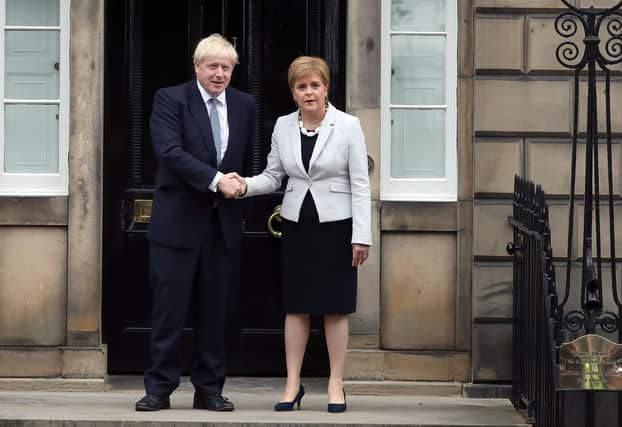SNP should stop 'power grab' rhetoric and put Scotland first – Brian Wilson


It might be a healthy sign of Scottish politics returning to normal when, before our very eyes, we can see the foundations of a grievance being laid.
Inevitably, it is a grievance about “powers” – not what you do with them. The shorthand for the latest cause celebre is “state aids”, which can mean more or less what anyone wants it to.
Advertisement
Hide AdAdvertisement
Hide AdNicola Sturgeon, she who is above politics in a time of pandemic, perceived “a full-scale assault on devolution – a blatant move to erode the powers of the Scottish Parliament in key areas”. Phew, that sounds serious.
The Glendale Thunderer, Ian Blackford, roared in the House of Commons that it was the “biggest power grab since the Scottish people voted overwhelmingly for the Scottish Parliament in 1997”. (Quick reminder: These powers currently reside in Brussels).
So far, it is grievance without definition. No matter how much one may regret the existence of Brexit, the reality cannot be wished away that it will result in many powers which currently rest with the EU reverting to the UK.
That, in turn, will lead to many of them – over a hundred, according to Michael Gove – going straight to Holyrood. There will inevitably be disputed areas which demand negotiation and perhaps adjudication on where powers should reside.
The pretence that this is all bad news for Scotland should be abandoned. Insofar as we have had any specificity from the complainers, it is that they want Scotland to set our own regulations in areas which would have the effect of disrupting a single UK market.
From any rational perspective, this is bonkers. Why would anyone want barriers within the UK – with which Scotland has two-thirds of our trade – while pledging fealty to a single EU market? Nobody without an anti-English bone in their body will see logic in that. The term “state aid” is associated with putting money into businesses to make them more competitive within (currently) the EU. That has frequently been used to the detriment of Scottish businesses and industries. Is it such a bad thing to be freed from that curtailment on the legitimate role of government?
Equally, however, it is far from clear that different state aid rules within the UK would work to our advantage. Alignment with flexibility makes sense. Competing regimes do not. That should be the territory of negotiations, not megaphone diplomacy. There should be recognition of opportunities rather than pre-cooked accusations of perfidy.
One area in which there is certainly a potentially positive side to Brexit is procurement. How many jobs have been lost because EU procurement rules force competition with other states who may or may not be playing by the same rules?
Advertisement
Hide AdAdvertisement
Hide AdAn obvious example lies in renewable energy, where Scotland has enjoyed minimal economic benefits because the manufacturing jobs have gone to Spain, Germany and Denmark. That does not seem to me a great advertisement for the status quo. Dare we aspire to something better?
There has been much publicity about a round of offshore “floating wind” projects, with a projected supply chain of £8 billion. However, Crown Estate Scotland – effectively an arm of the Scottish Government – has refused to make Scottish/UK supply chain commitments an essential condition for winning these projects, as it could do post-Brexit.
Gary Smith, Scottish secretary of the GMB union, described it as the “final surrender in the fight for renewables jobs” which will continue to be “outsourced to the rest of the world”. That is exactly what has been happening, largely due to EU procurement rules. Is the intention now to carry on as before?
It is a case study in the usual dichotomy between the fixation on “powers” and failure to use the ones that exist. Scotland’s politicians now have a choice between negotiating hard for maximum advantage from a changed environment which, however one may disapprove of it, offers positives as well as negatives.
Alternatively, they can bore on about “power grabs” while dismissing new powers which, without doubt, will arise. In other words, play to the gallery or put Scotland first.
A message from the Editor:
Thank you for reading this article on our website. While I have your attention, I also have an important request to make of you.
With the coronavirus lockdown having a major impact on many of our advertisers - and consequently the revenue we receive - we are more reliant than ever on you taking out a digital subscription.
Subscribe to scotsman.com and enjoy unlimited access to Scottish news and information online and on our app. With a digital subscription, you can read more than 5 articles, see fewer ads, enjoy faster load times, and get access to exclusive newsletters and content. Visit www.scotsman.com/subscriptions now to sign up.
Advertisement
Hide AdAdvertisement
Hide AdOur journalism costs money and we rely on advertising, print and digital revenues to help to support them. By supporting us, we are able to support you in providing trusted, fact-checked content for this website.
Joy Yates
Editorial Director
Comments
Want to join the conversation? Please or to comment on this article.